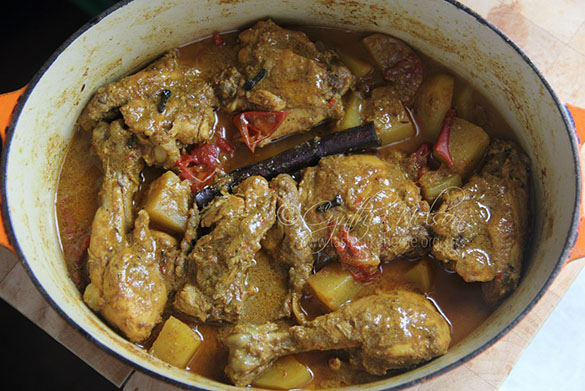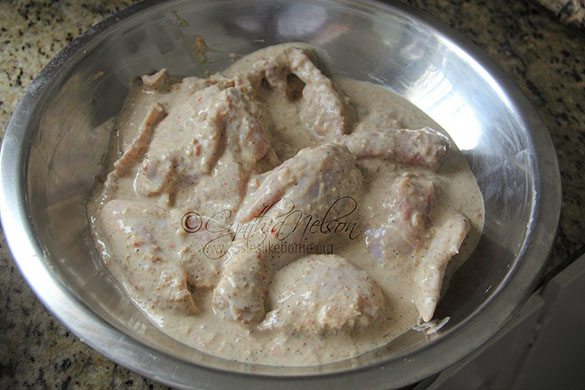What’s the main dish that appears on your Sunday lunch table every week? Is it Roast Chicken, Baked Pork, Roast Beef, Stewed Chicken with Callaloo, Soup, Curried Chicken? The repetitive familiarity of these dishes keeps us grounded, however, every now and then we like to change things up a bit by using a different herb or spice combo to season and cook these familiar dishes. As a student of curry (the term and all that it encompasses), I am always on the lookout for different spice mixes and herb combos to try, so when I read about a Nepalese-style Chicken Curry, also referred to as Gurkha Chicken Curry I knew I had to give it a try.
This 3-step curry draws heavily on the cuisine of the ethnic Nepali people of India, known as the Gurkhas. It is mild in flavour, and though it may look like the Chicken Curry to which you are accustomed, it is not. While this is an important distinction to make, it is also necessary so that when you make and eat the curry, you do not compare it to the Chicken Curry with which you are familiar. It is different. It is another type of Chicken Curry.
The mildness in flavour comes from the use of several spices in their whole form to cook the curry. You may recall from my What’s Cooking column on spices, that when applied whole to food, spices provide subtle flavour but when ground to a fine powder and added to pastes and marinades, the flavour is more pronounced. Do not take the mildness of the Gurkha Chicken Curry to mean that it is lacking in any way, it is not; the curry uses spices generally used for curries – coriander seeds, cumin/jeera, fennel, cardamom, cinnamon, cloves, and turmeric as well as ginger, garlic, onions, bay leaf and pepper. How-ever, it is the application of these spices and aromatics that makes this curry one-of-a-kind. If you’re thinking of introducing people to Chicken Curry, this would be a good place to start. And if you’re thinking of making a different kind of Chicken Curry for your next Sunday lunch meal, give this version a try.
In addition to the application of the spices, the 3-stage prep and cooking of the curry is also what makes it different. It is perfect for Sunday lunch because parts 1 and 2 are necessary to do ahead and can easily be done on Saturday. Here’s how it goes.
Marinate chicken overnight for best flavor (Photo by Cynthia Nelson)
Stage 1 – Make the masala
You’ll need:
- 10 whole green cardamom pods, seeds removed
- 1 whole head of garlic, cloves peeled
- 1½ teaspoons fennel seeds
- 2 heaped tablespoons chopped fresh ginger
- Roughly chopped hot pepper, to taste
- 2 teaspoons fine table salt
- Add all the ingredients, except the salt, to a cold dry pan and place over medium heat. Dry roast until the pan is fragrant, takes about 2 minutes. Nothing has to develop a colour, you are just warming up the ingredients.
- Grind all the ingredients along with the salt to make a fine paste. Set aside.
Stage 2 – Marinating
You’ll need:
- 1 large whole chicken, about 4 pounds or the equivalent in thighs and drumsticks
- 1 heaped cup whole milk/full fat plain yogurt
- Salt to taste
- Masala paste (from stage 1)
- Cut the whole chicken into 12 pieces (breasts in 4, separate thighs and drumsticks, 2 whole wings and the back, halved). Remove the skin from the meat; rinse well and pat dry. Do the same if using thighs and drumsticks.
- Season with salt to taste and set aside.
- Mix together the yogurt and masala paste and pour over chicken, toss well to coat and mix. Cover tightly in an airtight container or bowl and refrigerate overnight.
Stage 3 – Cooking the curry
Remove the chicken from the refrigerator and bring up to room temperature. Meanwhile, gather the following ingredients:
Whole spices
- 3 tablespoons vegetable oil
- 1 cinnamon stick
- 5 whole cloves
- 1¼ teaspoons whole cumin/jeera
- 1 bay leaf
- 1 cup finely minced onions
Ground spices
- 1 tablespoon ground coriander powder
- 1 tablespoon ground cumin/jeera
- 1 teaspoon ground turmeric
Other ingredients
- 1 heaped cup chopped tomatoes
- 2 pounds potatoes cut into large chunks
- Chopped fresh cilantro/coriander (optional)
- 2 cups room temperature water
- Add the oil to a large deep pan such as a karahi, Dutch oven or similar pot and place over medium heat until hot. The oil should shimmer when properly heated.
- Toss in the cinnamon, cloves, jeera and bay leaf and cook until fragrant. Add the onions, stir to mix and cook until onions are softened (reduce the heat if necessary, you do not want to brown the onions).
- Raise heat to high and add the chicken and marinade to the pan, mix with the spices and cook for 5 – 7 minutes, turning the meat once or twice.
- Mix together the ground spices (coriander, cumin and turmeric) and sprinkle over the chicken. Toss to mix well and cook for 3 – 4 minutes then add tomatoes and potatoes. Cook together for 3 minutes.
- Add the water, give the pot/pan a good stir and bring to a boil, cover, reduce heat to medium and cook until the chicken is cooked through and the sauce has reduced and thickened (taste for seasoning – salt).
- Remove from heat and let sit for 10 minutes. If using, sprinkle cilantro/coriander before serving.
There you have the 3 stages to cooking this Nepalese-style Chicken curry. A few things to note:
- Unlike our style of Chicken curry where the meat is cut smaller, this curry is made with large cuts of chicken, making it even more appealing as a main dish.
- The marinating of the chicken for an extended period of time is necessary for the flavours to meld; overnight is really best but if you are in a rush at least marinate for 1 hour. I find that there is a difference in taste between the length of time the chicken is left to rest with the masala paste.
- This curry is best eaten with roti or a similar type of flatbread; the mildness of the curry really compliments a roti. However, you can certainly eat the curry with rice.
- A traditional Guyanese curry is highly spiced, and the rice works well to balance the dish, however, I found that with this Gurkha-style Chicken Curry, the flavours get lost in the rice.
Cynthia











